Question
I am having a hard time answering these questions; 1. Here is an erroneous argument proving that if (xP(x))(xQ(x)) is true, then x(P(x) Q(x)) is
I am having a hard time answering these questions;
1. Here is an erroneous argument proving that if (xP(x))(xQ(x)) is true, then x(P(x) Q(x)) is true. Identify the error(s) in this argument.
(xP(x)) (xQ(x)) (Premise) (1) xP(x) (Simplification, 1) (2)
P(c) (Existential instantiation, 2) (3)
xQ(x) (Simplification, 1) (4)
Q(c) (Existential instantiation, 4) (5)
P(c) Q(c) (Conjunction, 3, 5) (6)
x(P(x) Q(x)) (Existential generalization, 6) (7)
2. Show that if x(P(x) (Q(x)S(x))) is true and x(P(x) R(x)) is true, then x(R(x) S(x)) is true. (Give a deductive proof.)
3. Which of these collections are partitions of the set of integers?
(a) the set of even integers and the set of odd integers.
(b) the set of positive integers and the set of negative integers.
(c) the set of integers divisible by 3, the set of integers leaving a remainder of 1 when divided by 3, and the set of integers leaving a remainder of 2 when divided by 3.
(d) the set of integers less than 100, the set of integers with absolute value not exceeding 100, and the set of integers greater than 100.
(e) the set of integers not divisible by 3, the set of even integers, and the set of integers that leave a remainder of 3 when divided by 6.
3. Which of these are posets? Justify each answer.
(a) (Z, =)
(b) (Z, 6=)
(c) (Z, )
Step by Step Solution
There are 3 Steps involved in it
Step: 1

Get Instant Access to Expert-Tailored Solutions
See step-by-step solutions with expert insights and AI powered tools for academic success
Step: 2

Step: 3

Ace Your Homework with AI
Get the answers you need in no time with our AI-driven, step-by-step assistance
Get Started


